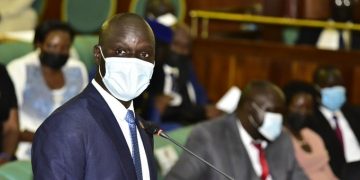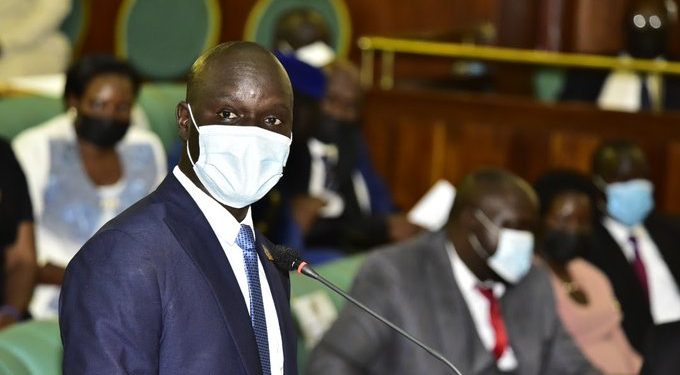The Finance State Minister, Hon. Henry Musasizi, has asked the Members of Parliament to approve up to Shs3.5 trillion to finance the Shs48.1 trillion budget.
The first loan request which is up to US$464 translating to about Shs1.7 trillion, is to be sourced from the Standard Chartered Bank.
In documents which now stand referred to Parliament’s Committee on National Economy, Standard Chartered Bank will merely be an agent for two financial institutions that will actually supply the cash, should Parliament approve the loan request.
Whereas Musasizi said Standard Chartered Bank “emerged the best bidder with the lowest cost of financing provided to government,” £272 million of the loan will be sourced from Nippon Export and Investment Insurance (NEXT), a Japanese trade and investment insurance firm, while £182.7 million will be picked from the Islamic Corporation for the Insurance of Investment and Export Credits (ICIEC).
Standard Chartered Bank’s role in the borrowing will be that of “agent and mandated lead arranger for the loan”.
Musasizi defended the loan, saying it is intended to “help pay outstanding infrastructure certificates among others to avoid accumulating arrears during the financial year”.
He also said because of financial constraints, the government managed to only finance seven per cent of the different votes’ development expenditure, which he said will have an effect on budget performance and economic recovery.
NEXT will charge an interest of 2.9 per cent on their facility, whereas their counterpart the ICIEC will reap 3.5 per cent from their credit.
The loan’s maturity period is 10 years, with an additional grace period of four years.
Separately, Musasizi also tabled a US$140 million loan request to be picked from the International Development Association, a facility that comes with a US$60 million grant.
This, he said, will finance the Uganda Digital Acceleration Project (UDAP).
Musasizi said the project is intended to “expand access to high-speed internet, improve the efficiency of Digital Government Services, and strengthen the digital inclusion of the host communities and refugees [where the project will be implemented]”.
Another loan request to be sourced from the same agency is a US$331.5 million loan, which comes with a grant totalling US$276.5 million.
This particular facility will be used to “finance the electricity access scale-up projects”.
Minister Musasizi said the loan is critical in electricity access expansion across the country.
“[This loan facility] seeks to facilitate at least one million electricity connections covering households, commercial enterprises, industrial parks, mining centres and public institutions,” said Musasizi.
The two facilities together add up to US$471 million, which is merged with the US$464 Standard Chartered Bank arranged facility totals up to about Shs3.5 trillion.
The committee will be expeditiously processing the requests to inform Parliament’s decision to approve or reject the loan requests.









